|
|
|
Sort Order |
|
|
|
Items / Page
|
|
|
|
|
|
|
| Srl | Item |
| 1 |
ID:
124649
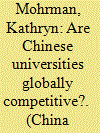

|
|
|
|
|
| Publication |
2013.
|
| Summary/Abstract |
This article compares five leading Chinese universities with 16 other research-intensive institutions in Asia, Europe and the United States. All the universities demonstrate an increasing commitment to research, although the fastest growth between 2003 and 2007 occurred in Asian institutions. Beijing and Qinghua universities compare favourably in terms of funding, but their research output is not as highly regarded. Despite concerns about academic freedom, the international standing of at least some Chinese universities is likely to rise in the future.
|
|
|
|
|
|
|
|
|
|
|
|
|
|
|
|
| 2 |
ID:
124648
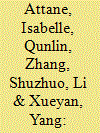

|
|
|
|
|
| Publication |
2013.
|
| Summary/Abstract |
Traditionally, marriage is a near universality in China. However, in the coming decades, owing to the growing sex imbalance, millions of men will be unable to marry. As a consequence, bachelorhood is becoming a new demographic concern, particularly affecting men from the most disadvantaged socio-economic groups. In China's cultural context today, heterosexual marriage remains a prerequisite for family formation and, in rural society particularly, the legitimate setting for sexual activity. Under such circumstances, bachelorhood is likely to produce privations on various fronts, the consequences of which for both the individual and the community are still largely unknown. This article focuses on the opinions and sexual behaviour of bachelors, and highlights significant variations from those of married men. It is based on the findings of an exploratory survey conducted in 2008 in selected villages in a rural county in Anhui province, referred to here as JC county. The survey provides insights into the more general situation of rural men unable to marry in a context of female shortage, and indicates the conditions a growing number of Chinese men will face in the near future.
|
|
|
|
|
|
|
|
|
|
|
|
|
|
|
|
| 3 |
ID:
124642
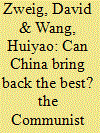

|
|
|
|
|
| Publication |
2013.
|
| Summary/Abstract |
For some developing countries, the international flow of their human talent in the recent decade was more of a "reverse brain gain" than a "brain drain." China, too, joined the group of states whose students, after studying abroad, now found sufficient opportunity and an acceptable quality of life back home to make returning after graduation a reasonable option. Still, China had not succeeded in bringing back the very best scientists and academics. To remedy this problem, the Organization Department of the Chinese Communist Party became actively involved in the recruitment process. The key programme was the "1000 Talents" Plan, introduced in 2008 by Politburo member Li Yuanchao, who had a visionary perspective on reverse migration. This programme has succeeded in bringing back entrepreneurs full time; but it has not attracted the very best of the Chinese scientists and academics who studied and lived overseas to return fulltime.
|
|
|
|
|
|
|
|
|
|
|
|
|
|
|
|
| 4 |
ID:
124644
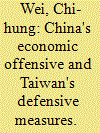

|
|
|
|
|
| Publication |
2013.
|
| Summary/Abstract |
This article explains how Taiwan's Democratic Progressive Party (DPP) administration was able to restrict cross-Strait fruit trade and resist China's "fruit offensive" in a democratic setting. During 2004-2005, China implemented various preferential policies for the importation of Taiwanese fruit and wooed Taiwanese farmers in the rural south, where political support for the DPP was concentrated. However, trade statistics show that cross-Strait fruit trade only increased slightly, making up just 4 or 5 per cent of Taiwan's total fruit exports during 2005-2008. I argue that focusing solely on regime type ignores the formal and informal policy instruments a democratic state can wield to manage its commercial ties with, and resist economic offensives from, other states. Cross-Strait fruit trade was limited because the DPP used legal as well as corporatist informal policy instruments to resist China's fruit offensive. I conclude that state-society institutional relations explain cross-Strait economic relations and economic statecraft better than regime type alone.
|
|
|
|
|
|
|
|
|
|
|
|
|
|
|
|
| 5 |
ID:
124647
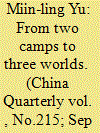

|
|
|
|
|
| Publication |
2013.
|
| Summary/Abstract |
The worldview as reflected in the textbooks of the People's Republic of China during 1949-1966 centred on Party-led nationalism, anti-imperialism and anti-colonialism. This article emphasizes both the continuities and changes in nationalist ideology during the Republican and Maoist periods. First, textbooks in Maoist China presented the imperialist powers as shifting away from Britain, Russia and Japan under the KMT government and towards the United States (since 1949) and the Soviet Union (since the 1960s), and emphasized class struggle. Second, the CCP had far greater control over the production of textbooks than the KMT. In this sense, the CCP truly carried out "partified" (danghua) education, a goal shared by the KMT which it never had the ability to achieve. In addition, "the language of Cultural Revolution" appeared with the outbreak of the Korean War. In other words, the education that cultivated revolutionary successors began in the early 1950s.
|
|
|
|
|
|
|
|
|
|
|
|
|
|
|
|
| 6 |
ID:
124651
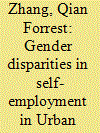

|
|
|
|
|
| Publication |
2013.
|
| Summary/Abstract |
This article presents the first quantitative analysis of gender disparities in self-employment in urban China. It documents the extent of gender income inequality in self-employment. By disaggregating self-employment into three occupational classes, it reveals the gender segregation within self-employment - women were concentrated in the financially least rewarding segment - and identifies it as a main source of gender income inequality. I examine a range of determinants of participation in self-employment, including family structure, family background and career history, and how their gender-specific effects contribute to gender segregation. Although using data from a 1996 national survey, this study captures two key processes that shaped the structure of self-employment in contemporary urban China: the restructuring of the state sector and the growth of financial returns and social status in the private sector, both of which contributed to the formation of gender segregation in self-employment.
|
|
|
|
|
|
|
|
|
|
|
|
|
|
|
|
| 7 |
ID:
124637
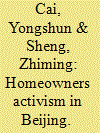

|
|
|
|
|
| Publication |
2013.
|
| Summary/Abstract |
It is commonly accepted that leaders play a crucial role in collective action. Existing literature has suggested a number of factors that contribute to the emergence of leaders including, among others, personality, sense of moral responsibility, community pressure, self-interest and institutional exclusion. However, current research tends to suggest that activists are driven by a particular reason to become leaders and that their motivation is static. Based on intensive fieldwork in residential communities in Beijing, this article illustrates that leaders' motivations can be mixed or multiple and that leaders may re-prioritize or adjust their objectives over the course of collective action. The re-prioritizing tends to alter the leaders' behaviour and affect group solidarity and interactions with other group members.
|
|
|
|
|
|
|
|
|
|
|
|
|
|
|
|
| 8 |
ID:
124640
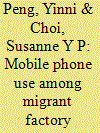

|
|
|
|
|
| Publication |
2013.
|
| Summary/Abstract |
Comparing ethnographic and interview data in three contrasting production arrangements in a labour-intensive factory in South China, this article argues that while the mobile phone constitutes a new contested terrain on the shop floor and facilitates control and resistance between capital and labour simultaneously, the dynamics of control and resistance is contingent upon the exact arrangements of production. While the management strictly prohibit line operators in the assembly line department from using their mobile phones, they turn a blind eye towards mobile phone use among workers in the hardware department, and mandate mobile workers who are not fixed at work stations in both departments to use mobile phones. Diverse managerial control tactics have generated different patterns of worker resistance. Workers in the assembly line department employ strategies to evade managerial surveillance and continue to use mobile phones at work covertly. They also contest the double standards of mobile phone use displayed by the management. Workers in the hardware department challenge the boundaries of legitimate mobile phone use, and mobile workers use tactics to escape being tracked down by the management via their mobile phones. Mobile phones also facilitate the strategy of resistance through exit among all workers.
|
|
|
|
|
|
|
|
|
|
|
|
|
|
|
|
| 9 |
ID:
124639
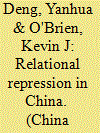

|
|
|
|
|
| Publication |
2013.
|
| Summary/Abstract |
Chinese local officials frequently employ relational repression to demobilize protesters. When popular action occurs, they investigate activists' social ties, locate individuals who might be willing to help stop the protest, assemble a work team and dispatch it to conduct thought work. Work team members are then expected to use their personal influence to persuade relatives, friends and fellow townspeople to stand down. Those who fail are subject to punishment, including suspension of salary, removal from office and prosecution. Relational repression sometimes works. When local authorities have considerable say over work team members and bonds with protesters are strong, relational repression can help demobilize protesters and halt popular action. Even if relational repression does not end a protest entirely, it can limit its length and scope by reducing tension at times of high strain and providing a channel for negotiation. Often, however, as in a 2005 environmental protest in Zhejiang, insufficiently tight ties and limited concern about consequences creates a commitment deficit, partly because thought workers recognize their ineffectiveness with many protesters and partly because they anticipate little or no punishment for failing to demobilize anyone other than a close relative. The practice and effectiveness of relational, "soft" repression in China casts light on how social ties can demobilize as well as mobilize contention and ways in which state and social power can be combined to serve state ends.
|
|
|
|
|
|
|
|
|
|
|
|
|
|
|
|
| 10 |
ID:
124646


|
|
|
|
|
| Publication |
2013.
|
| Summary/Abstract |
This article focuses on the adaptation of the Red Classics - a collection of literary and cinematic works depicting the Communist armed struggle produced in the PRC between 1949 and 1966 - for contemporary Chinese television. Using the controversy over the remake of Tracks in the Snowy Forest (Linhai xueyuan ????) as a case study, it explores the complexity of restaging the Communist revolution in the post-Mao reform era. Competition in the media industry compels TV producers to re-package Communist history for fragmented contemporary audiences - those who are familiar with the original Red Classics as well as those who grew up in the reform era and who are far removed from the revolutionary legacy. Adaptation of the Red Classics is a sensitive issue. By focusing on the sexual desires and individual interests muted in the original Red Classics in order to cater for the tastes of younger viewers, the remakes offer alternative readings of history and have incurred government censorship. Opposition to the adaptations has also come from a distinct mnemonic community, the Red memory group, whose members came of age in either the 1960s or during the Cultural Revolution and who absorbed the Red Classics in their formative years. The interplay of state politics, collective memory and commercial imperatives ultimately makes the repackaging of the revolution for contemporary mass entertainment a multifaceted and highly contentious issue.
|
|
|
|
|
|
|
|
|
|
|
|
|
|
|
|
| 11 |
ID:
124641
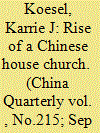

|
|
|
|
|
| Publication |
2013.
|
| Summary/Abstract |
This article investigates the similarities between the organizational innovation of one underground Protestant house church in China and the rise of early communist parties. Much like the spread of communism, the organizational tactics of the church are designed to protect it in a hostile political environment. The different levels are insulated from each other, with limited knowledge of the members above and below. In this way, if anyone is raided by the authorities, the others can continue to function with little interruption. Thus, the highly touted "organizational weapon" developed by the Bolsheviks and recycled, for example, by the Chinese Communist Party in their struggle for power, has resurfaced many years later. However, this time it has been adopted by a religious "vanguard."
|
|
|
|
|
|
|
|
|
|
|
|
|
|
|
|
| 12 |
ID:
124643
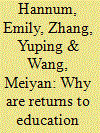

|
|
|
|
|
| Publication |
2013.
|
| Summary/Abstract |
It is well established that returns on education are higher for women than for men in urban China. We argue that this finding, while accurate, is misleading owing to its individualist perspective. The income to which most working-age women and men have access includes not only their own income, but also spouse income. Furthermore, decisions about participation and investment in the labour force, both consequential for income trajectories, are likely to be made with partner income and potential income in mind. To our knowledge, no research in China has explored the returns to education enjoyed via spouse income, or the implications of pooling couple income, for illuminating the returns to schooling difference for women and men. In this article, using data from the China Urban Labour Survey (2001), we argue that the returns for women, conventionally defined, are higher than for men because many women trade their own income for spouse income, and this is particularly true among less educated women. We demonstrate, first, that women who are more educated are less likely to get married, while the reverse is true for men. Second, we show that among couples there is evidence of a trade-off in investments in careers. Moreover, among couples, the less educated the woman and the more educated the man, the less likely the couple is to depend heavily on her income. Finally, we show that among couples there is a compensating reverse pattern of returns differences by sex when income is conceptualized as spouse income. Thus, in terms of total couple income, there are no returns differences by sex.
|
|
|
|
|
|
|
|
|
|
|
|
|
|
|
|
|
|
|
|
|